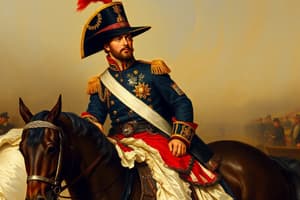Podcast
Questions and Answers
Which event significantly began Napoleon's downfall?
Which event significantly began Napoleon's downfall?
- The Battle of Waterloo
- His exile to Elba
- The invasion of Russia in 1812
- The Hundred Days (correct)
What led to Napoleon's first abdication and exile?
What led to Napoleon's first abdication and exile?
- His defeat at the Battle of Waterloo
- The loss of support from his generals
- His military successes in Russia
- The impact of his disastrous campaign in Russia (correct)
The period after Napoleon's escape from Elba is known as what?
The period after Napoleon's escape from Elba is known as what?
- The Hundred Days (correct)
- The Napoleonic Era
- The French Revolution
- The Bourbon Restoration
Where did Napoleon die after his final exile?
Where did Napoleon die after his final exile?
What is the overall nature of Napoleon's legacy?
What is the overall nature of Napoleon's legacy?
In what year was Napoleon Bonaparte born?
In what year was Napoleon Bonaparte born?
Which of these best describes Napoleon's initial rise to prominence?
Which of these best describes Napoleon's initial rise to prominence?
What was the main result of Napoleon's campaigns in Italy?
What was the main result of Napoleon's campaigns in Italy?
In what year did Napoleon overthrow the Directory?
In what year did Napoleon overthrow the Directory?
What was the primary purpose of the Napoleonic Code?
What was the primary purpose of the Napoleonic Code?
Which of these was a major domestic reform introduced by Napoleon?
Which of these was a major domestic reform introduced by Napoleon?
How did Napoleon view his role in Europe?
How did Napoleon view his role in Europe?
What was a key feature of Napoleon's military tactics?
What was a key feature of Napoleon's military tactics?
Flashcards
Turning point in Napoleon's rule
Turning point in Napoleon's rule
A moment in 1812 when Napoleon's invasion of Russia backfired and significantly weakened his position.
The Hundred Days
The Hundred Days
The period in 1815 when Napoleon briefly regained power after escaping exile and returning to France.
Battle of Waterloo
Battle of Waterloo
A decisive battle in 1815, where Napoleon was finally defeated and exiled, ending his rule.
Napoleon's Legacy
Napoleon's Legacy
Signup and view all the flashcards
Napoleonic Code
Napoleonic Code
Signup and view all the flashcards
What is the Napoleonic Code?
What is the Napoleonic Code?
Signup and view all the flashcards
How did Napoleon succeed militarily?
How did Napoleon succeed militarily?
Signup and view all the flashcards
How did Napoleon rise to power?
How did Napoleon rise to power?
Signup and view all the flashcards
How did Napoleon consolidate his power?
How did Napoleon consolidate his power?
Signup and view all the flashcards
What were Napoleon's domestic policies?
What were Napoleon's domestic policies?
Signup and view all the flashcards
How did Napoleon dominate Europe?
How did Napoleon dominate Europe?
Signup and view all the flashcards
What were Napoleon's lasting effects on Europe?
What were Napoleon's lasting effects on Europe?
Signup and view all the flashcards
What is Napoleon's legacy?
What is Napoleon's legacy?
Signup and view all the flashcards
Study Notes
Early Life and Rise to Power
- Born on August 15, 1769, in Ajaccio, Corsica.
- Entered the French military academy at a young age.
- Quickly rose through the ranks during the French Revolution, demonstrating exceptional military talent and strategic acumen.
- Showed a knack for understanding and exploiting weaknesses in enemy formations.
- Exploited the political instability of the Directory and the growing public dissatisfaction to seize power.
Military Campaigns and Achievements
- Masterminded numerous successful campaigns across Europe, including victories in Italy and Egypt.
- Defeated Austria and Sardinia in Italy, establishing French dominance in the region.
- Led campaigns against the Austrians, Prussians, and Russians, often winning decisive victories.
- His military campaigns expanded French influence and territory.
- Introduced innovative military tactics and strategies, including the use of rapid maneuvers and concentrated firepower.
- Established a powerful military machine that dominated Europe for a period.
Consolidation of Power
- Overthrew the Directory through a coup d'état in 1799. Became First Consul, effectively gaining a dominant position in French politics.
- Established a strong centralized government.
- Created a sophisticated bureaucracy to manage and administer the vast territory under French control.
- Ceased all opposition and established a dictatorship, gradually centralizing power around himself.
- Issued significant social and political reforms to strengthen his control.
Domestic Policies and Reforms
- Introduced important legal reforms, including the Napoleonic Code.
- The Napoleonic Code codified French civil law, promoting equality under the law.
- Reorganized French finances, stabilizing currency and improving public works.
- Promoted education and instituted a system of schools and universities.
- Created a vast network of infrastructure projects, roads, canals, public buildings, and bridges.
- His reforms aimed to strengthen France's economy and power.
European Domination
- Built a vast French empire, conquering or controlling most of continental Europe.
- Forced many European nations into alliances or conquered territories as part of his empire.
- Saw himself as a modernizer and a liberator of Europe.
- Restructured the borders of several European states.
- Created client states ruled by pro-French governments.
- Facing resistance, his constant warfare led to high casualties and resentment from various countries.
Fall from Power
- The disastrous invasion of Russia in 1812 marked a turning point in his fortunes.
- Massive losses demoralized and weakened his army.
- His enemies capitalized on his retreat.
- Forced to abdicate his throne in 1814, and exiled to Elba.
- Escaped from exile and returned to power for a brief period known as the Hundred Days.
- The Battle of Waterloo in 1815, a decisive defeat, saw him exiled again to Saint Helena, where he died in 1821.
Legacy
- Napoleon's legacy is complex and multifaceted.
- He is viewed as a brilliant military strategist, a reformer, and a powerful leader.
- His actions reshaped the political landscape of Europe.
- Also often seen as a tyrant and aggressor.
- His Napoleonic Code had a profound influence on legal systems worldwide.
- His impact on military organization, civil administration, and European diplomacy was substantial.
Studying That Suits You
Use AI to generate personalized quizzes and flashcards to suit your learning preferences.
Description
Explore the early life and rise to power of Napoleon Bonaparte, detailing his military education and rapid ascent during the French Revolution. Delve into his key military campaigns that established French dominance across Europe, showcasing his innovative strategies and tactics.




